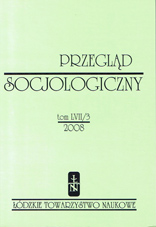Polityka Unii Europejskiej wobec uniwersytetów w budowaniu gospodarki opartej na wiedzy (GOW)
The european union policy towards universities as regards creating knowledge-based economy
Author(s): Julita JabłeckaSubject(s): Social Sciences
Published by: Łódzkie Towarzystwo Naukowe
Keywords: university; knowledge-based economy; European Union; neo-liberalism; globalization; New Public Management
Summary/Abstract: The purpose of the submitted text is to demonstrate the involvement of the European Union in the reconstruction process of the European knowledge-based economy, as well as the EU policy towards universities in the construction process of the European knowledge-based economy, as well as elucidate the following four theses. – As regards the EU policy towards European universities concerning the creation of knowledge based economy, the European Commission undertakes actions in order to influence the external conditions of operating universities, including the character of relations between universities and EU member countries, but also the internal conditions in terms of modernizing universities. – The involvement of the European Union includes not only problems which are formally within the responsibilities of this body but – indirectly – also matters which remain beyond the range thereof (higher level education is within the competence of the national governments of the EU member countries), although officially it implements the so-called ‘open coordination rule’. – Both the content and the language of the European Commission documents concerning universities and related to implementing the Lisbon strategy and creating the knowledge based economy has clearly been influenced by other parallel processes which took place at the turn of the Millennium, namely the dominance of the neo-liberal ideas, progressive globalization and the New Public Management (NPM). – The rhetoric and argumentation of the EU documentation is frequently dramatically different from the language used by university representatives. Examples of such linguistic and formal discrepancies can be observed in the case of the stance taken by the European University Association in reference to a number of crucial documents issued by the European Commission.
Journal: Przegląd Socjologiczny
- Issue Year: 57/2008
- Issue No: 3
- Page Range: 37-58
- Page Count: 22
- Language: Polish

